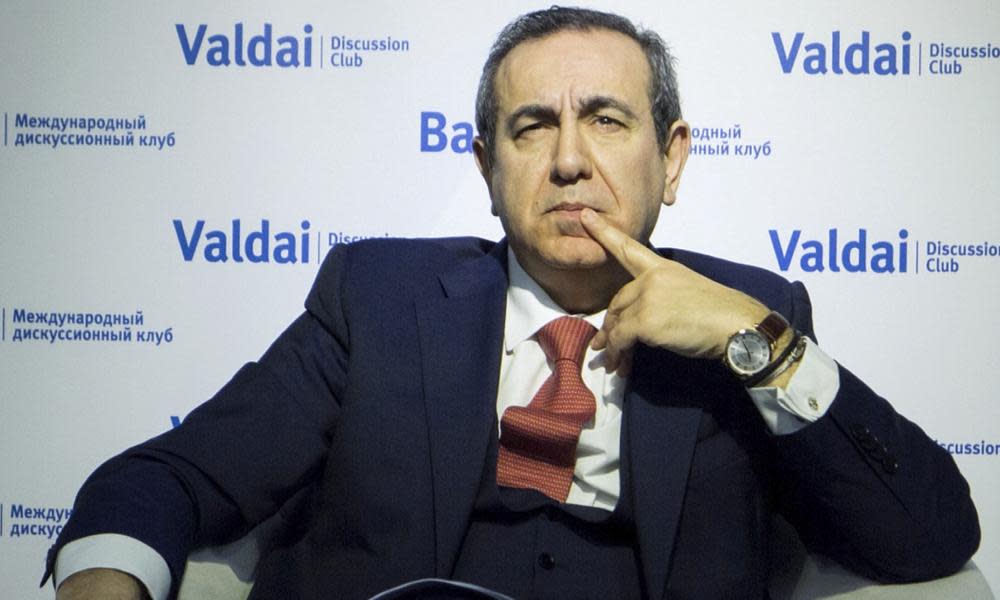Why has Britain given such a warm welcome to this shadowy professor?

‘Professor” Joseph Mifsud once said he was not a Russian spy. Then he vanished and stayed vanished despite multiple attempts by journalists to put pertinent questions to him. Though he is not named in the indictment, prosecutors working for the Mueller inquiry into Russian involvement in Donald Trump’s election allege this ghostly presence, this incredible vanishing man, was the conduit between the Trump foreign policy adviser George Papadopoulos and a Kremlin with “dirt” to share on Hillary Clinton. The rest of us are in the dark. But perhaps not wholly so.
Papadopoulos has pleaded guilty to lying to the FBI, and joined the list of officials who would rather send their former friends on the alt right to jail than go to jail themselves. For his part, the “professor” has at least raised questions about how respectable academic institutions and the highest levels of British politics are open to penetration by kleptomaniac regimes.
Anyone who examines Mifsud’s career should be wary of believing a word he says. But on one point he is right. He’s not a traditional spy, if your image of the spy is a brutal cold war colonel from the KGB. He appears to be something altogether more modern.
Mifsud is from Malta. He received a Phd from Queen’s University, Belfast in 1995, on how to reform primary school education, and then served as an assistant to a Maltese foreign minister, which I suppose gave him a little experience of diplomacy. In 2008, he popped up at the EMUNI University in Slovenia. It may not be Europe’s most distinguished academic institution, but it was too distinguished for Mifsud. The Times of Malta reported he left in haste after pocketing €39,000 in expenses, including an impressive €13,767 for mobile calls.
Where would a man like this head to? Why, dear old London town, of course, where half the oligarchs, thieves, spies, spivs and shits on the planet are welcomed. Mifsud set up the “London Academy of Diplomacy” and boasted to the Washington Diplomat that it was “one of the best diplomatic academies in the world”.
Mifsud denies any wrongdoing and is, of course, innocent until proved guilty. Still, when the necessary caveats have been made, I have to say the London Academy of Diplomacy does not look like an elite diplomatic finishing school. It’s my fault, for having a suspicious mind but at first glance it appears to resemble just the type of front organisation an espionage agency would establish.
“It felt like something was weird,” Simona Mangiante told the Guardian last week. “I never met any Russians there… But the centre certainly wasn’t what it pretended to be.”
Mifsud recruited Mangiante from the European parliament because of her excellent contacts book. Through the academy, she met and fell in love with Papadopoulos. She’s now moved in with him in Chicago, but remembered that, while the academy had an impressive London address in a townhouse overlooking Lincoln’s Inn Fields, behind its doors there was just one table for the staff to work from. They had to supply their own laptops and were wary of the “sneaky” Mifsud.
Undeterred by the rickety surroundings, Mifsud quickly found institutions ready to boost his credentials. The University of East Anglia took him on in 2011 and claimed he was a professor, although no one can see how he earned the title. In 2016, he moved to Stirling University, which was delighted that he flew “the University of Stirling flag” at “high-profile” meetings with Putin. You have to have encountered the fierce jealousy with which academics guard their specialisms to realise how unusual it is for two universities to treat Mifsud as an authority on international diplomacy when what expertise he possessed was on early years education.
I asked Stirling and East Anglia what academic qualifications Mifsud had for the posts they granted him, what checks they had run on his academy and what financial arrangements they had made with him. Britain’s universities are as bad at replying to questions in the public interest as they are at defending freedom of speech. Stirling refused to answer. East Anglia said it might get back to me this week.
Tellingly, as soon as the scandal broke, the London Academy of Diplomacy closed its doors. It’s almost as if it were an intelligence asset whose cover had been blown, rather than an academic institution dedicated to an impartial understanding of international affairs. But for a few years, East Anglia and Stirling helped Mifsud appear to be an expert on diplomacy. He put his unearned reputation to work. At one point, Mifsud said he was close to the Clinton Foundation. At another, he befriended and hired Gianni Pittella, the Italian leader of the Alliance of Socialists and Democrats in the European parliament.
Naturally, Mifsud moved in on Boris Johnson and the Tory right, which is delighting Russia by weakening the European Union. Alok Sharma, a Foreign Office minister until June this year, confirmed Mifsud had attended a fundraising dinner in his constituency. Mifsud boasted he would be “meeting Boris Johnson for dinner re Brexit”. And indeed he did meet our immeasurably incompetent foreign secretary.
I don’t know how the Mifsud affair will end. But I do know this. When we talk of tax havens laundering dirty money, we should think of London and New York as well as the Virgin Islands and Bermuda. When we talk of politicians who doff the cap to Putin, we should think of the Brexit right and Labour left as well as the dictators running central Asian republics. And perhaps, when we talk of spies, we will soon need to think less of cruel men extracting secrets from terrified victims and more of podgy “professors” pushing at open doors.

 Yahoo News
Yahoo News 
